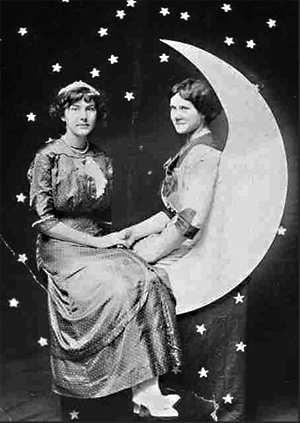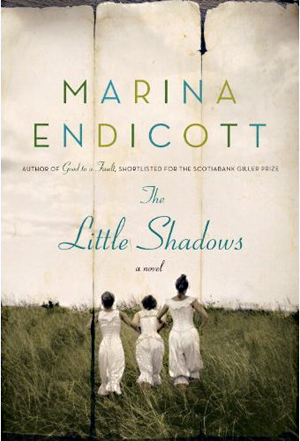
What is life? it is the flash of a firefly in the night
the breath of a buffalo in the wintertime
the little shadow which runs across the grass
and loses itself in the sunset
— Crowfoot
By Leslie Savage
Marina Endicott’s novel The Little Shadows is a whirlwind of a book — not shadowy at all, on the surface — telling the story of three sisters, Aurora, Belle and Clover, who with their Mama travel the vaudeville circuits of Western Canada and the USA between 1912 and 1917. The story recounts their often desperate attempts to keep body and soul together after the death of their schoolteacher father.
The book at first seems like a mad romp through the glitter and sometimes the sleaze, of what was known in the first decades of the 20th century as Polite Vaudeville. We meet a cast of colourful and improbable but somehow believable characters—actors, impresarios, theatre managers, singers and dancers — who people the world of the stage. Along with the intricately detailed descriptions of vaudeville acts including the comic, the sentimental, the sweet and the clownish, this makes for a book that’s almost dizzying. Not unlike an evening at a vaudeville theatre, full of laughs, tears, stunts and sentiment, an evening that soars and crushes, a world of entertainment and forgetting, of memory and tears and laughter.
Endicott has done her homework — it took her eight years to write the book — and is an actor and playwright herself, so the detail in
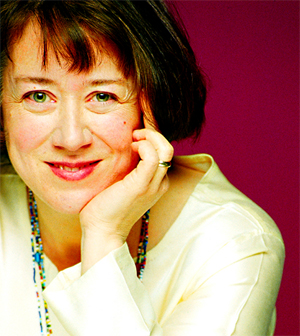
this book is nothing short of phenomenal. Vaudeville comes alive on the pages in all its visual and auditory excitement.
Polite Vaudeville it may have been, but behind the scenes, the lives of the sisters, their mama, their friends and those who are less than friendly, are full of even more drama than the acts on stage. The story begins in 1912, when the girls are 16, 15 and 13 years old. They come of age, all of them, in the dressing rooms, back hallways and garishly lit lobbies of the opera theatres that were built in many small towns across the prairies in the first decades of the 20th century. Also in the boarding houses and cheap hotels where they sleep, eat, and cut and sew their costumes, and practice.
It is, for entertainers, practice that makes perfect, and one part of the story is about how hard perfomers work, developing routines, taking lessons in song and dance, working out steps and sequences of the skits they devise, worrying about whether their songs, voices, dances, and outfits will please the managers and the audiences. The grind of pleasing is constant, and the anxiety is always high. Even once the chronic concern about money is allayed by a measure of success, the back story is always about whether voice and appearance and impression will please, eroding any sense of permanence or any temptation towards self-satisfaction.
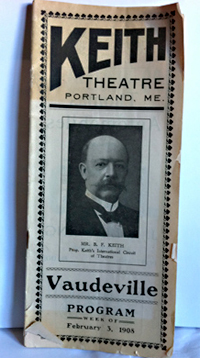
The magic of the theatre here is possibly as it is everywhere: that play acting on stage can lead to honesty in, or at least about, life. Aurora puts this into words when she replies to a somewhat prim schoolmaster suitor who has said he “wants to honour” what is between them. “I don’t care much about honour,” she says, “I want to be honest.”
The ending of the story — in fact the last third of the book — develops a sweetness that’s wholly missing from the opening chapters, possibly because we by then have become fond of the sisters, and their different personalities shine through the theatrical chaos of their lives and of the first contextualizing chapters of the book.
Vaudeville was about entertainment. To understand it, we have to imagine a world without radio, television, the movies, colour reproduction in books and magazines — a a world in which people went out to public spaces for entertainment, and for the most part had to find some consistency between what entertained them on Saturday and what the preacher said on Sunday.
To understand this world, you might want to visit Marina Endicott’s web site (http://www.marinaendicott.com). You can listen to some of the music from this era of theatre and watch some of the U-Tube vaudeville videos. You can watch Frances Gumm, the youngest of the singing dancing Gumm sisters, who became, in the 1930s, Judy Garland. She and her sisters were not unlike the Belles Aurores, performing on stage night after long night. Other stars who had their start in vaudeville include Bob Hope, Big Crosby and W.C. Fields. It’s a world mainly forgotten, largely inaccessible, but brought to vibrant and glorious life in Endicott’s book.
The allegorical link between vaudeville and life is the connection celebrated here with almost
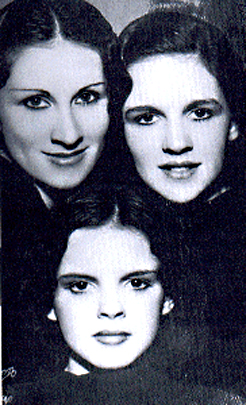
riotous pleasure in the ups and downs, ins and outs, on-stage and backstage fores and afters of inner workings of Theatre Writ Large. Shadows in the grass they may be, these performers whose work has been upstaged by Hollywood and now by a myriad of entertainment forms whose origins include this forgotten world. It was a world not widely respected by the audiences who loved it — and provides rich opportunity for musing about the links and disjunctions between what we live and the ways we like to entertain ourselves.
The Little Shadows won the Commonwealth Writers’ Prize for Canada and the Caribbean and was shortlisted for the Scotiabank Giller Prize in 2011. Marina Endicott was born in Golden and now lives in Edmonton.
EXPLORE FURTHER
Judy Garland video – The Gumm Sisters
http://cinephilefix.wordpress.com
for a history of vaudeville
